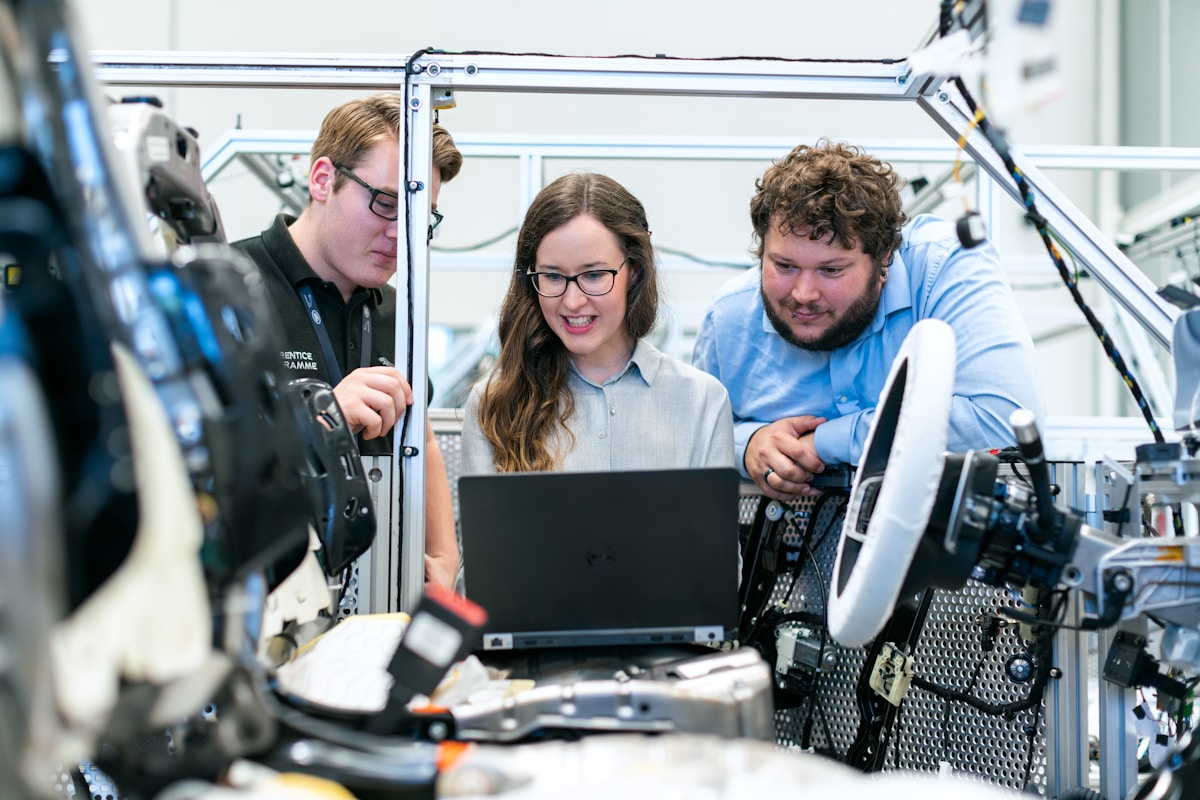AI-PROOF JOBS: The 50 Careers That Will SURVIVE the AI Revolution in 2025
Key Takeaways
- AI will displace 92 million jobs by 2030 but create 170 million new ones—a net gain of 78 million positions (World Economic Forum, 2023)
- Healthcare professionals like nurse practitioners will see 45.7% growth by 2032—the #1 AI-resistant career field (U.S. Career Institute)
- Four human superpowers that make careers AI-proof: emotional intelligence, creativity, physical dexterity, and ethical judgment
- Reddit analysis reveals skilled trades and healthcare are consistently mentioned as most resistant to AI (Reddit, 2023-2025)
- Cybersecurity shows 33% projected growth through 2033 as human judgment remains essential for threat response
The Hard Truth About AI and Your Career (That No One’s Telling You)
Here’s the reality most career “experts” won’t tell you: AI is coming for millions of jobs, and the transformation is happening FASTER than anyone predicted.
But here’s what they’re also not telling you: Not all careers face the same risk. Not even close.
While bookkeepers, data entry clerks, and basic content writers are seeing their jobs evaporate, entire categories of careers remain not just safe but are GROWING at unprecedented rates.
Stanford University research found the key dividing line: AI struggles with tasks requiring genuine human emotion, creativity, physical dexterity, and ethical judgment. These four human superpowers create a protective barrier between you and automation.
The Four Human Superpowers AI Can’t Replicate (Yet)
Before diving into specific careers, you need to understand WHY certain jobs resist automation while others don’t. Four fundamental human capabilities create an almost impenetrable barrier against AI replacement:
1. Emotional Intelligence: The Ultimate Career Shield
AI can detect basic emotions, but it cannot truly empathize or form authentic human connections.
Dr. Kai-Fu Lee, CEO of Sinovation Ventures and AI expert, puts it bluntly: “AI pushes us toward creating more humanistic service roles that demand genuine empathy… machines don’t have hearts.”
Why this matters: Any career requiring trust-building, emotional support, or human connection has built-in protection against AI. The human connection isn’t a “nice-to-have”—it’s the core service.
2. Creative Innovation (Not Just Content Generation)
AI can generate content based on patterns, but it fundamentally lacks original thought. As the McKinsey Global Institute found, “AI-generated work is actually just recombining elements from its training data, making it inherently derivative rather than truly creative.”
Why this matters: Jobs demanding true innovation, artistic expression, and novel problem-solving maintain a significant competitive advantage. AI can assist creative processes but cannot replace the genuine human creativity that drives originality.
3. Physical Dexterity and Environmental Adaptation
The Department of Labor’s research on automation exposure confirms that jobs requiring arm-hand steadiness, finger dexterity, and physical coordination face substantially less AI exposure.
Why this matters: Careers requiring physical presence, adaptability to unpredictable environments, and manual dexterity have a built-in barrier to automation that will persist for decades.
4. Ethical Judgment and Complex Decision-Making
Perhaps the most profound human capability is ethical reasoning—weighing complex factors, considering moral implications, and making judgment calls in ambiguous situations.
Why this matters: Fields where decisions impact human welfare, require ethical considerations, or involve navigating ambiguity need human oversight. AI can process information but lacks the moral framework for truly ethical decisions.
The 9 Most AI-Proof Career Categories (With Hard Data)
Let’s examine the specific career fields that leverage these human superpowers and show the strongest evidence for long-term security.
1. Healthcare: The Undisputed Leader in AI-Proof Careers
Healthcare professionals consistently top every analysis of automation-resistant careers due to their unique combination of technical knowledge and irreplaceable human elements.
Nurse Practitioners: The #1 Growth Champion
The evidence: Nurse practitioners show a staggering 45.7% projected growth by 2032—the highest of any occupation on our list. With a median annual wage of $120,680, this career offers both security and substantial compensation.
Why they’re safe: Their role combines clinical expertise with patient-centered care, requiring:
- Split-second clinical decisions based on subtle patient cues
- Emotional support during health crises
- Personalized communication tailored to patient needs
- Physical examination requiring tactile feedback
The path: Requires a Master’s or doctoral degree in nursing—but the ROI is exceptional given the growth rate and median salary.
Mental Health Professionals: Automation-Proof by Design
The evidence: Mental health counselors (22.1% growth), marriage and family therapists (13.9% growth), and substance abuse counselors all show strong growth projections through 2032.
Reddit insight: “As long as artificial intelligence lacks the ability to experience empathy, I believe we are in a safe position” (Reddit, 2023)
Why they’re safe: The therapeutic alliance—the bond between practitioner and client—forms the foundation of effective mental health treatment. This relationship relies on:
- Genuine empathy and emotional presence
- Nuanced interpretation of verbal and non-verbal cues
- Adaptive treatment approaches
- Ethical judgment in complex situations
The path: Typically requires a Master’s degree in psychology, counseling, or social work. The growing destigmatization of mental health services continues to drive demand.
Physical Medicine Specialists: Hands-On Healing
The evidence: Physical therapists (16.9% growth), occupational therapists (13.9% growth), and athletic trainers (17.5% growth) all show robust growth projections.
Why they’re safe: These careers combine:
- Physical assessment through touch and observation
- Customized treatment plans requiring real-time adaptation
- Motivational coaching to encourage therapeutic adherence
- Manual techniques requiring physical dexterity
The path: Usually requires a doctorate for physical therapists, master’s for occupational therapists. The aging population and focus on non-pharmaceutical approaches to pain continues to drive growth.
2. Skilled Trades: The Physical World’s Complexity Shield
While everyone focuses on white-collar jobs, skilled trades represent some of the most automation-resistant careers due to their physical complexity and unpredictable environments.
Electricians and Specialized Installers
The evidence: Electricians show 11% projected growth through 2033, significantly above average for all occupations. The Bureau of Labor Statistics projects over 79,900 job openings annually through 2033.
Reddit insight: “AI is not going to fix that leaking shitter” (Reddit, 2023)
Why they’re safe: Electricians must:
- Diagnose complex electrical issues in varied environments
- Adapt installation techniques to different building structures
- Apply critical thinking when troubleshooting unique problems
- Ensure safety compliance in unpredictable conditions
The path: Typically requires apprenticeship and licensing rather than a degree—making this a high-ROI career path for those who prefer hands-on work.
Plumbers and Construction Specialists
The evidence: Plumbers, pipefitters, and steamfitters show approximately 10% projected growth through 2033.
Why they’re safe: These trades involve:
- Unique configurations requiring spatial problem-solving
- Real-time adaptation to unexpected conditions
- Physical manipulation in challenging environments
- Integration of new systems with existing infrastructure
The Reddit reality check: “In any world where millions of jobs are automated. You will immediately have millions of able-bodied, smart, hardworking men flood the trades. Within a few years you’ll be lucky to make $15 an hour” (Reddit, 2023)
The path: Apprenticeship programs offer paid training without college debt—a significant advantage for those entering the workforce.
3. Cybersecurity: Guarding the Digital Frontier
In an increasingly digital world, cybersecurity professionals demonstrate exceptional growth projections and automation resistance.
The evidence: Information security analysts show approximately 33% growth through 2033—nearly 8 times faster than the average for all occupations.
Why they’re safe: Cybersecurity work involves:
- Adversarial thinking to anticipate novel attacks
- Intuitive detection of subtle system anomalies
- Contextual judgment when evaluating potential threats
- Ethical decision-making during incident response
Reddit insight: “Human judgment remains a critical part of the cybersecurity process, especially in complex and high-pressure environments like breach response or when ethical and regulatory considerations come into play” (Reddit, 2024)
The path: Combines technical certifications with hands-on experience. Many professionals transition from IT roles, making this an accessible pivot for technology workers concerned about automation.
4. Education and Training: Shaping Human Potential
Educational roles maintain significant automation resistance, particularly for positions involving personalized instruction and mentorship.
The evidence: Post-secondary teachers show projected growth around 8% through 2033, with specialties like nursing instructors showing even stronger growth (21.5%).
Why they’re safe: Education involves:
- Adapting to diverse learning styles and needs
- Motivating students through relationship-building
- Managing complex classroom dynamics
- Providing emotional support during developmental challenges
Reddit insight: “Teachers… cultivate critical thinking and emotional intelligence, creating personalized learning experiences that machines cannot provide” (Reddit, 2023)
The path: Requirements vary from master’s degrees for professors to specialized certifications for vocational instructors. The most secure positions focus on areas requiring practical skills development rather than pure knowledge transfer.
5. Creative Direction and Strategy
While AI can generate basic content, roles involving creative strategy and direction maintain significant security.
The evidence: Roles like art directors, creative directors, and choreographers (29.7% growth) show strong resistance to automation.
Why they’re safe: These roles require:
- Original vision and conceptual innovation
- Cultural awareness and trend interpretation
- Direction of human teams and performances
- Strategic thinking beyond pattern recognition
Reddit insight: “AI can generate art or write copy, but it’s only as good as the prompts it gets. It doesn’t have the imagination to create Beyoncé-level magic” (Reddit, 2024)
The path: Typically combines education with progressive experience building a creative portfolio. The most secure positions blend creative vision with strategic business understanding.
6. Business Leadership and Human Management
Leadership positions demonstrate resilience through their need for human judgment, emotional intelligence, and ethical reasoning.
The evidence: While routine management tasks face automation, roles requiring complex human judgment show continued growth. For example, human resources managers show projected growth of about 5% through 2033.
Why they’re safe: Leadership roles involve:
- Complex decision-making with incomplete information
- Ethical judgment balancing multiple stakeholders
- Emotional intelligence in team development
- Strategic vision beyond data analysis
Reddit insight: “It’s called ‘human’ and not ‘artificial’ resources for a reason” (Reddit, 2023)
The path: Usually combines education with progressive leadership experience. The most secure positions focus on strategic direction and team development rather than routine oversight.
7. Law and Regulatory Compliance
Legal roles maintain security through their need for complex judgment, ethical reasoning, and human advocacy.
The evidence: Lawyers show projected growth of about 5% through 2033, with specialized areas like environmental law showing stronger growth.
Why they’re safe: Legal work involves:
- Complex interpretation of ambiguous regulations
- Ethical reasoning in novel situations
- Strategic advocacy and persuasion
- Client relationship management
Reddit insight: “The legal field requires interpreting nuanced laws and forming arguments, which are tasks that demand human judgment” (Reddit, 2023)
The path: Requires law degree and licensure, representing a significant educational investment. The most secure positions focus on complex advisory work rather than routine document processing.
8. AI Governance and Ethics
Ironically, the expansion of AI creates new roles focused on ensuring its responsible use—positions that require human judgment by definition.
The evidence: Gartner research suggests 75% of large organizations will have dedicated AI governance teams by 2026.
Why they’re safe: These emerging roles involve:
- Ethical oversight of AI systems
- Regulatory compliance in rapidly evolving landscapes
- Translation between technical capabilities and human values
- Stakeholder management across diverse perspectives
Reddit insight: “Key figures – experts who understand both the technical intricacies and the ethical implications of AI” are becoming essential (Reddit, 2024)
The path: Often combines technical understanding with ethics, policy, or legal expertise—a multidisciplinary approach that resists automation.
9. Specialized Design and Engineering
Engineering and design roles requiring complex judgment and physical application demonstrate significant automation resistance.
The evidence: Civil engineers show projected growth of 6.9% through 2033, with specialized roles in emerging technologies showing stronger growth.
Why they’re safe: These roles involve:
- Complex problem-solving with multiple constraints
- Adaptation to unique physical environments
- Integration of technical knowledge with practical application
- Ethical judgment in safety-critical situations
The path: Typically requires specialized education and progressive experience. The most secure positions focus on complex systems integration rather than routine design tasks.
What Reddit Users Say About AI-Proof Jobs
Reddit threads from 2023-2025 reveal consistent patterns in what jobs users consider most resistant to automation:
Most Frequently Mentioned AI-Resistant Jobs
- Healthcare providers: “Nursing is essential because, regardless of whether care choices are determined by AI, there will always be a need for a person to carry out those actions physically” (Reddit, 2023)
- Skilled trades: “Roofers, plumbers, electricians, HVAC experts, painters (like auto body, mechanics) anything where hands and skill are needed” (Reddit, 2023)
- Creative strategists: “The hardest part of engineering isn’t coding-it’s understanding irrational business demands and architecting solutions. AI can’t navigate human madness” (Reddit, 2023)
- Emergency services: “Firemen, police, and first responders in general” (Reddit, 2023)
Contrarian Reddit Insights
Not all Reddit users are optimistic about “AI-proof” jobs:
- No job is completely safe: “No job is safe. Within 10 years we have human like androids kinda like in Detroit Become Human” (Reddit, 2023)
- Unexpected automation patterns: “Originally people thought AI would first replace blue collar jobs and labor intensive work… It has actually progressed the opposite way, creative jobs will slowly become more obsolete and so will tech and development” (Reddit, 2023)
- Risk of oversaturation: “While many claim that skilled trades like electrical work, plumbing, and mechanics are secure, I wonder if an influx of displaced workers into these fields could lead to oversaturation” (Reddit, 2023)
50 AI-PROOF JOBS: The Complete List
Below is the comprehensive list of jobs with strong evidence for AI resistance, organized by category. Each includes growth projections and median annual salary (where available) based on Bureau of Labor Statistics data and industry research.
Healthcare Careers
- Nurse Practitioners: 45.7% growth by 2032 | $120,680
- Physician Assistants: 27.6% growth by 2032 | $121,530
- Mental Health Counselors: 22.1% growth by 2032 | $48,520
- Physical Therapists: 16.9% growth by 2032 | $95,620
- Occupational Therapists: 13.9% growth by 2032 | $85,570
- Marriage and Family Therapists: 13.9% growth by 2032 | $49,880
- Healthcare Social Workers: 11.1% growth by 2032 | $60,840
- Nurse Midwives: 7.5% growth by 2032 | $112,830
- Emergency Medical Technicians: 7.0% growth by 2032 | $35,470
- Speech-Language Pathologists: 19% growth by 2032 | $83,240
- Dental Hygienists: 9% growth by 2032 | $77,810
- Orthotists and Prosthetists: 16.8% growth by 2032 | $75,440
- Athletic Trainers: 17.5% growth by 2032 | $48,420
Skilled Trades
- Electricians: 11% growth by 2033 | $63,310
- Plumbers, Pipefitters, and Steamfitters: 10% growth by 2033 | $59,880
- HVAC Mechanics and Installers: 5% growth by 2033 | $54,690
- Construction Managers: 5% growth by 2033 | $98,890
- Automotive Service Technicians: 4% growth by 2033 | $46,970
- Wind Turbine Technicians: 45% growth by 2032 | $56,260
- Solar Photovoltaic Installers: 22% growth by 2032 | $47,670
- Line Installers and Repairers: 3% growth by 2032 | $78,350
- Aircraft Mechanics: 5% growth by 2032 | $65,380
Education & Training
- Nursing Instructors (Post-Secondary): 21.5% growth by 2032 | $77,440
- Coaches and Sports Instructors: 20% growth by 2032 | $38,970
- Psychology Professors: 9.6% growth by 2032 | $77,860
- Special Education Teachers: 3.5% growth by 2032 | $61,820
- Early Childhood Educators: 7% growth by 2032 | $35,330
- Vocational Teachers: 11% growth by 2032 | $62,040
- Education Administrators: 4.9% growth by 2032 | $98,420
Creative & Performance Arts
- Choreographers: 29.7% growth by 2032 | $42,700
- Art Therapists: 11.2% growth by 2032 | $59,500
- Music Therapists: 11.2% growth by 2032 | $59,500
- Set and Exhibit Designers: 5.2% growth by 2032 | $54,860
- Interior Designers: 0.9% growth by 2032 | $60,340
- Film and Video Editors: 7% growth by 2032 | $67,420
- Fashion Designers: 1% growth by 2032 | $75,810
- Multimedia Artists: 9% growth by 2032 | $78,790
Technology & Cybersecurity
- Information Security Analysts: 33% growth by 2033 | $112,000
- AI Ethics Specialists: High growth (emerging field) | $125,000-$180,000
- Systems Architects: 13% growth by 2033 | $133,000
- UX Researchers: 16% growth by 2033 | $98,000
- DevOps Engineers: 22% growth by 2033 | $120,000
- Cloud Security Engineers: 35% growth by 2033 | $138,000
- Blockchain Developers: 30% growth by 2033 | $155,000
Business & Leadership
- Human Resources Managers: 6% growth by 2033 | $126,230
- Management Analysts: 8% growth by 2033 | $95,290
- Training and Development Managers: 5% growth by 2033 | $120,130
- Chief Sustainability Officers: 8% growth by 2033 | $179,520
- Diversity and Inclusion Directors: 15% growth by 2033 | $116,000
Legal & Public Service
- Lawyers (specialized areas): 5% growth by 2033 | $135,740
- Compliance Officers: 5% growth by 2033 | $71,650
- Urban Planners: 3.8% growth by 2032 | $78,500
- Emergency Management Directors: 2.5% growth by 2032 | $76,730
- Firefighters: 4.3% growth by 2032 | $50,700
- Mediators & Arbitrators: 6% growth by 2033 | $73,920
- Environmental Health Specialists: 5% growth by 2033 | $78,230
Culinary & Hospitality
- Executive Chefs: 11% growth by 2033 | $58,920
- Sommelier/Beverage Directors: 9% growth by 2033 | $63,680
- Event Planners: 8% growth by 2033 | $49,470
- Food Scientists: 3% growth by 2033 | $78,600
Remember: The growth rates and salaries are industry averages. Your potential earnings and opportunities will vary based on location, experience, and specialization. The key to future-proofing isn’t just picking a “safe” job—it’s developing the hybrid skills that make you irreplaceable in ANY field.
The 3-Step Plan to Future-Proof Your Career (Starting Today)
Understanding which careers have automation resistance is only half the battle. Here’s the practical action plan to position yourself for long-term security:
Step 1: Develop Hybrid Skill Sets
The single most powerful strategy is developing what I call “hybrid skill sets”—combinations of technical knowledge and distinctly human capabilities that create unique value.
The evidence: LinkedIn’s Global Talent Trends report found that professionals with “hybrid skill sets” command 40% higher salaries and show 58% more resilience during economic downturns.
Effective combinations include:
- Technical expertise + creative thinking
- Data analysis + ethical judgment
- Digital literacy + emotional intelligence
- Subject specialization + interdisciplinary thinking
Action step: Identify one technical and one human capability to develop in the next 90 days. Create a specific learning plan with measurable milestones.
Step 2: Position Yourself as an AI Collaborator
The most dangerous mindset is viewing AI as the enemy. Instead, position yourself as an AI collaborator who leverages these tools for greater productivity.
The evidence: MIT research found that human-AI collaboration outperforms either humans or AI working independently across multiple domains.
Reddit insight: “I would view AI as something that enables rather than completely replaces” (Reddit, 2023)
Key approaches:
- Learn to write effective prompts for AI tools
- Develop skills for evaluating and refining AI outputs
- Understand when to use AI versus human judgment
- Create workflows that leverage both human and AI strengths
Action step: Identify three routine tasks in your current role that could be automated, and develop a plan to focus your time on higher-value activities requiring human judgment.
Step 3: Build Your Evidence Portfolio
In an AI-influenced job market, showing evidence of your human capabilities becomes crucial.
The evidence: Harvard Business Review reports that employers increasingly value demonstrated capabilities over credentials alone.
Effective approaches:
- Create a portfolio showcasing complex problem-solving
- Document examples of innovative thinking and adaptation
- Collect testimonials highlighting your emotional intelligence
- Develop case studies demonstrating your ethical judgment
Action step: Create a “human capabilities portfolio” documenting specific examples where you’ve demonstrated creativity, emotional intelligence, complex problem-solving, or ethical judgment.
What This Means for You (The Bottom Line)
Let me be crystal clear: AI will eliminate millions of jobs. That’s not hype—it’s reality backed by data from every major economic research organization.
But with disruption comes massive opportunity for those positioned correctly.
The professionals who will not just survive but THRIVE in this new landscape are those who understand exactly which human capabilities create lasting value and systematically develop those capabilities starting today.
Don’t wait for AI to eliminate options. Take decisive action now to position yourself in careers that leverage the four human superpowers: emotional intelligence, creativity, physical dexterity, and ethical judgment.
The dividing line between career growth and career extinction isn’t whether you work with technology—it’s whether you develop the human capabilities that complement rather than compete with AI.
The time to future-proof your career isn’t next year. It’s right now. Which side of the AI revolution will you be on?
Frequently Asked Questions About AI-Proof Careers
Will AI completely eliminate certain job categories?
Answer: While some highly routine jobs face significant disruption, complete elimination of entire job categories remains unlikely. Historical evidence shows technological revolutions transform rather than eliminate work. The World Economic Forum projects that while AI may displace 92 million jobs by 2030, it will simultaneously create approximately 170 million new positions, resulting in a net gain of 78 million jobs globally. The key isn’t whether a field will exist, but how roles within that field will evolve to incorporate AI capabilities while leveraging uniquely human strengths.
What skills should I focus on developing to remain employable in an AI-driven economy?
Answer: The most valuable skills combine technical literacy with distinctly human capabilities. Focus on developing emotional intelligence, creative problem-solving, ethical judgment, and cultural awareness—areas where humans maintain advantages over machines. Additionally, cultivate adaptability and learning agility, as the ability to quickly acquire new skills becomes increasingly valuable in a rapidly changing landscape. Finally, develop the ability to collaborate effectively with AI tools, understanding both their capabilities and limitations. Microsoft’s Work Trend Index found that professionals who effectively collaborate with AI tools show 37% higher productivity and 29% higher job satisfaction.
Are creative jobs truly safe from AI, given advances in generative AI tools?
Answer: Creative jobs are transforming rather than disappearing as AI tools advance. While AI can generate content based on patterns in its training data, it fundamentally lacks the lived experience, cultural understanding, and authentic voice that drive truly innovative creative work. Adobe research found that 94% of creative professionals now use AI tools, but 86% report these tools enhance rather than replace their creative work. Creative professionals increasingly use AI for exploration and efficiency while providing the human judgment, cultural context, and emotional resonance that give creative work its impact. The most secure creative positions combine technical skill with strategic thinking, cultural awareness, and authentic perspective that machines cannot replicate.
Which healthcare roles are most and least vulnerable to AI disruption?
Answer: Healthcare roles involving direct patient care, complex decision-making, and emotional support demonstrate the greatest resilience against automation. Nurse practitioners, physical therapists, and mental health professionals combine technical expertise with human capabilities that resist automation. More vulnerable healthcare positions include those focused on data analysis, routine diagnostics (such as certain radiology functions), and administrative processing. However, even in these areas, AI typically augments rather than replaces human workers, shifting their focus to higher-value activities requiring judgment and interpersonal skills. Mayo Clinic research found that AI integration in healthcare tends to elevate rather than eliminate clinical roles, with professionals focusing more on complex case management and patient interaction.
How will AI impact job prospects for recent graduates?
Answer: Recent graduates face both challenges and opportunities in an AI-influenced job market. Routine entry-level tasks traditionally assigned to new graduates may face automation, potentially reducing some traditional pathways into professions. However, graduates with hybrid skill sets—combining technical literacy with distinctly human capabilities—often find themselves well-positioned for emerging roles. Additionally, recent graduates typically demonstrate greater comfort with new technologies, potentially giving them advantages in roles requiring human-AI collaboration. National Association of Colleges and Employers research indicates that employers increasingly value graduates who demonstrate both technical competency and strong “human skills” like critical thinking, communication, and adaptability.
Should I change careers if my current field faces significant AI disruption?
Answer: Career transitions deserve careful consideration beyond just automation potential. Before changing fields, assess the specific aspects of your role most vulnerable to automation and consider how your position might evolve rather than disappear. McKinsey research found that 87% of workers will need to adapt their skills within their current roles rather than change careers entirely. Many professionals find greater success adapting within their field—leveraging industry knowledge while developing new capabilities—than completely starting over. If you do decide to transition, focus on fields that leverage your transferable skills while offering greater automation resistance. Additionally, consider roles adjacent to your current field that might provide a bridge between your existing expertise and new opportunities.
How can skilled trade workers ensure their long-term relevance in an increasingly automated economy?
Answer: Skilled trade workers can enhance their long-term security through several strategies. First, stay current with evolving technology in your field, as trades increasingly incorporate digital tools alongside physical skills. Second, develop specializations in areas requiring complex problem-solving and adaptation, which pose greater challenges for automation. Third, cultivate business and customer service capabilities that extend beyond technical work—client relationships and project management remain distinctly human domains. Finally, consider developing expertise in emerging areas like sustainable building, smart home integration, or specialized restoration, where complex judgment and adaptive skills maintain human centrality. Construction Industry Institute research indicates that trade workers who integrate technological tools show 27% higher productivity and command 34% higher wages than those who rely solely on traditional methods.
Conclusion: The AI-Proof Career Advantage
The next decade will create unprecedented disruption in the job market. That’s not fearmongering—it’s reality backed by data from every major economic research organization.
But with disruption comes massive opportunity for those positioned correctly.
The professionals who will not just survive but THRIVE in this new landscape are those who understand exactly which human capabilities create lasting value and systematically develop those capabilities starting today.
Don’t wait for AI to eliminate options. Take decisive action now to position yourself in careers that leverage the four human superpowers: emotional intelligence, creativity, physical dexterity, and ethical judgment.
The dividing line between career growth and career extinction isn’t whether you work with technology—it’s whether you develop the human capabilities that complement rather than compete with AI.
The time to future-proof your career isn’t next year. It’s right now. Which side of the AI revolution will you be on?
Talk Resumes with Wealth Waggle
Perfect your resume with AI-assisted feedback and tips (using the latest recruiting intelligence).









